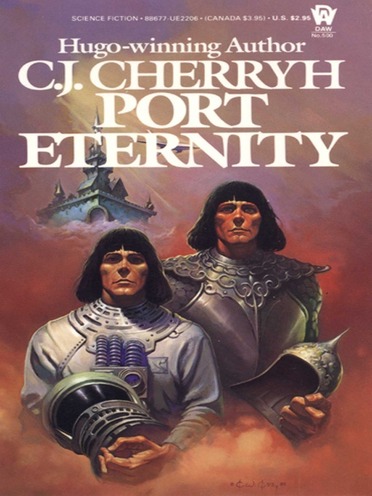










Port Eternity is an attempt to turn the Camelot legend into modern space opera, via the mechanism of Cherryh's lab-born 'azi' people that are part of her 'Alliance' universe, who get almost all of their knowledge and upbringing via tape. On a private ship that is the only locale of this story one of the crewmembers (all of whom are named for characters in the legend, on the whim of the ship's owner) gets hold of a tape detailing the Camelot story, and she naturally identifies with one of the characters therein. The ship is grabbed and held in jumpspace by some unknown large body, which requires all the ship members to carefully re-adjust how they 'see' the external world. During this process, the rest of the crew are exposed to the Camelot tape, and to some extent now are compelled to act like their legend's counterparts. The external threat that drives the dynamics of the character's actions comes from the large body that captured the ship, with its denizens apparently trying to break into the ship.
While this is an intriguing setup, the particulars of this story don't gel. The parallels with the Arthurian legend are certainly present, but the angst and tragedy of the original are not translated to this book. Perhaps this is because the characters, other than Elaine, the main viewpoint character, are not described in enough depth to make them emotionally engaging. This is especially a pity in the case of Lance, who remains a cipher throughout this book, and yet is one of the most conflicted and interesting characters of the legend.
The book does somewhat better thematically, as the question of whether the azi clones really have souls and can truly take independent action beyond their tape programming is explored in some depth. This is a theme that Cherryh detailed in much greater depth in Cyteen, but the main lines of her thoughts in this area are competently presented here, and provide some definite food for thought.
One of her 'odder' books, not totally successful, but it is readable, and provides another view of the moral dilemma that made Cyteen so great.

